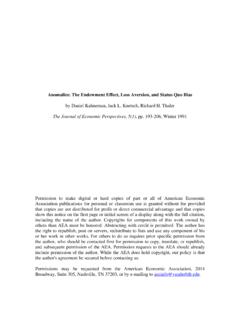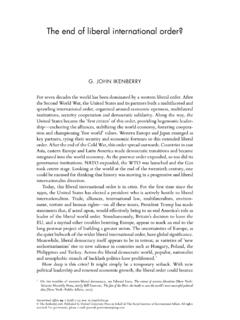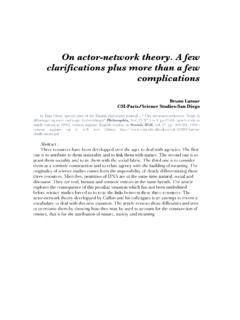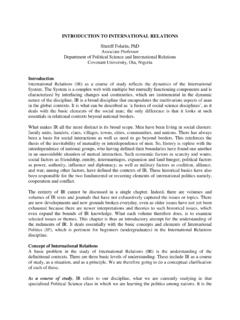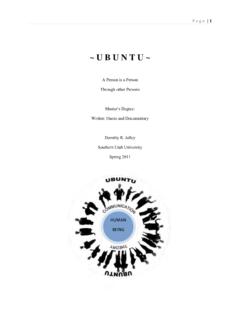Transcription of ROUNDTABLE: RISING POWERS AND THE INTERNATIONAL …
1 ROUNDTABLE: RISING POWERS AND THE INTERNATIONAL ORDERWhy the Liberal World Order WillSurviveG. John IkenberryThe INTERNATIONAL order built and led by the United States and its part-ners is in crisis. In the Middle East, East Asia, and even in WesternEurope, long-standing regional orders are in transition or breakingdown. Global INTERNATIONAL agreements and institutions across the realms oftrade, arms control, environment, human rights seem to be weakening. Forseventy years the United States has stood at the center of a Western-oriented,liberal INTERNATIONAL system, organized around openness, rules, and multilateralcooperation.
2 After the cold war this American liberal hegemonic order spreadoutward and seemed to offer the world a universal logic for global that unipolar moment has now passed. Today, the United States and theWestern industrial democracies, roiled by nationalist and populist upheavals,have turned inward and appear less committed to their own post-war liberalinternational crisis of the American-led INTERNATIONAL order would seem to open up newopportunities for RISING states notably China, India, and other non-Westerndeveloping countries to reshape the global order.
3 But in what ways are risingstates seeking to reform or reorganize the rules and institutions of the post-warera? Do they seek to rise up and integrate into the existing INTERNATIONAL orderor do they seek to transform it? Are they stakeholder or revisionist states?Over the past decade, these questions have stood at the center of debates aboutthe future of the global system. Indeed, the Obama administration placed the chal-lenge of integrating RISING states at the center of its foreign policy. In the words ofSecretary of State Hillary Clinton, the American goal was to create not a multi-polar world order but a multi-partner one.
4 A grand bargain seemed to be onoffer: RISING states would be welcomed into the leadership core of governanceEthics & INTERNATIONAL Affairs, , no. ( ), pp.. Carnegie Council for Ethics in INTERNATIONAL Affairsdoi: . /S 17 from Princeton Univ, on 28 Jun 2018 at 14:10:04, subject to the Cambridge Core terms of use, available atinstitutions in exchange for agreeing to embrace its rules and norms and shouldergreater burdens in providing public goods. In the meantime, the financialcrisis seemed to weaken and discredit aspects of the American-led liberal interna-tional order, creating opportunities for China in particular to advance claims forits own leadership.
5 China s ambitious plans for the newly established AsianInfrastructure Investment Bank and the One Belt, One Road vision for Eurasianeconomic cooperation are striking reflections of shifting power relations andstruggles over the terms of global order. In this essay I look at the evolving encounters between RISING states and thepost-war Western INTERNATIONAL order. My starting point is the classic power tran-sition perspective. Power transition theories see a tight link between internationalorder its emergence, stability, and decline and the rise and fall of great is a perspective that sees history as a sequence of cycles in which powerful orhegemonic states rise up and build order and dominate the global system untiltheir power declines, leading to a new cycle of crisis and order building.
6 Incontrast, I offer a moreevolutionaryperspective, emphasizing the lineages andcontinuities in modern INTERNATIONAL order. More specifically, I argue thatalthough America s hegemonic position may be declining, the liberal internationalcharacteristics of order openness, rules, multilateral cooperation are deeplyrooted and likely to persist. This is true even though the orientation and actionsof the Trump administration have raised serious questions about the commit-ment to liberal internationalism. Just as importantly, RISING states (led by China)are not engaged in a frontal attack on the American-led order.
7 While struggles doexist over orientations, agendas, and leadership, the non-Western developingcountries remain tied to the architecture and principles of a liberal-oriented globalorder. And even as China seeks in various ways to build rival regional institutions,there are stubborn limits on what it can Transitions and INTERNATIONAL OrderThere is wide agreement that the world is witnessing a long-term global powertransition. Wealth and power is diffusing, spreading outward and away fromEurope and the United States. The rapid growth that marked the non-Western ris-ing states in the last decade may have ended, and even China s rapid economicascendency has slowed.
8 But the overall pattern of change remains: the rest aregaining ground on the West. 18G. John from Princeton Univ, on 28 Jun 2018 at 14:10:04, subject to the Cambridge Core terms of use, available atWhile there is wide agreement that the world is witnessing a global power tran-sition, there is less agreement on the consequences of power shifts for interna-tional order. The classic view is advanced by realist scholars, such asE. H. Carr, Robert Gilpin, Paul Kennedy, and William Wohlforth, who makesweeping arguments about power and order. These hegemonic realists arguethat INTERNATIONAL order is a by-product of the concentration of power.
9 Order iscreated by a powerful state, and when that state declines and power diffuses, inter-national order weakens or breaks apart. Out of these dynamic circumstances, arising state emerges as the new dominant state, and it seeks to reorganize theinternational system to suit its own purposes. In this view, world politics fromancient times to the modern era can be seen as a series of repeated cyclesof rise and decline. War, protectionism, depression, political upheaval varioussorts of crises and disruptions may push the cycle narrative of hegemonic rise and decline draws on the European and, morebroadly, Western experience.
10 Since the early modern era, Europe has beenorganized and reorganized by a succession of leading states and would-be hege-mons: the Spanish Hapsburgs, France of Louis XIV and Napoleon, andpost-Bismarck Germany. The logic of hegemonic order comes even more clearlyinto view with Pax Britannica, the nineteenth-century hegemonic order based onBritish naval and mercantile dominance. The decline of Britain was followed bydecades of war and economic instability, which ended only with the rise of PaxAmericana. For hegemonic realists, the debate today is about where the worldis along this cyclical pathway of rise and decline.







